Related Research Articles
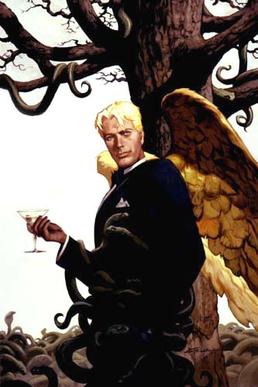
Lucifer Samael Morningstar is a character who appears in American comic books published by DC Comics. He is an adaptation of Lucifer—the Biblical fallen angel and devil of Christianity—and is one of the most powerful beings in the DC Universe. Though various versions of the Devil have been presented by DC Comics, this interpretation by Neil Gaiman debuted in The Sandman #4 in 1989. Lucifer appears primarily as a supporting character in The Sandman and as the protagonist of the spin-off Lucifer.

Darby and Joan is a proverbial phrase for a married couple content to share a quiet life of mutual devotion.
A devil is a fictional classification of monsters in the Dungeons & Dragons roleplaying game. Often used as a high-level challenge for players of the game, devils are Lawful Evil in alignment and originate from the Nine Hells of Baator. True to their Lawful Evil alignment, devils are locked in a strict and brutal hierarchy, changing form as they work their way up the ladder of power. At the top of the hierarchy are the supreme Archdevils, or Lords of the Nine, who are the rulers of the different regions of Baator. Devils often see the various worlds in the D&D metacosmos as tools to use for their own ends, including prosecuting the Blood War, a millennia-long war between the devils and their arch-enemies, demons.

Pat Ingoldsby is an Irish poet and TV presenter. He has hosted children's TV shows, written plays for the stage and for radio, published books of short stories and been a newspaper columnist. Since the mid-1990s, he has withdrawn from the mass media and is most widely known for his collections of poetry, and his selling of them on the streets of Dublin.
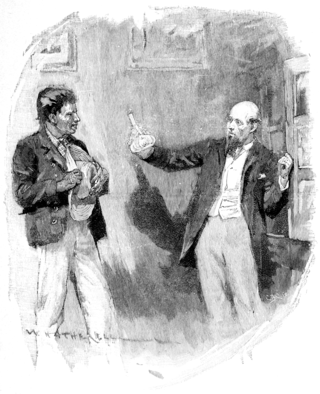
"The Bottle Imp" is an 1891 short story by the Scottish author Robert Louis Stevenson usually found in the short story collection Island Nights' Entertainments. It was first published in the New York Herald and Black and White London. In it, the protagonist buys a bottle with an imp inside that grants wishes. However, the bottle is cursed; if the holder dies bearing it, his or her soul is forfeit to hell.
"Captain Wedderburn's Courtship" is an old Scottish ballad dating from 1785 or earlier. It is Child Ballad #46, Roud 36. It is known by a number of titles, including "Lord Roslin's Daughter" and "The Laird of Rosslyn's Daughter".
The Farmer's Curst Wife is a traditional English language folk song listed as Child ballad number 278 and number 160 in the Roud Folk Song Index.
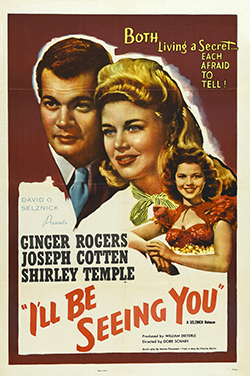
I'll Be Seeing You is a 1944 American drama film made by Selznick International Pictures, Dore Schary Productions, and Vanguard Pictures, and distributed by United Artists. It stars Joseph Cotten, Ginger Rogers, and Shirley Temple, with Spring Byington, Tom Tully, and John Derek. It was produced by Dore Schary, with David O. Selznick as executive producer. The screenplay was by Marion Parsonnet, based on a radio play by Charles Martin (1910-1983).
"The Face upon the Barroom Floor", aka "The Face on the Floor" and "The Face on the Barroom Floor", is a poem originally written by the poet John Henry Titus in 1872. A later version was adapted from the Titus poem by Hugh Antoine d'Arcy in 1887 and first published in the New York Dispatch.
L. Ron Hubbard used the term incident in a specific context for auditing in Scientology and Dianetics: the description of space operatic events in the Universe's distant past, involving alien interventions in past lives. It is a basic belief of Scientology that a human being is an immortal spiritual being, termed a thetan, trapped on planet Earth in a "meat body".
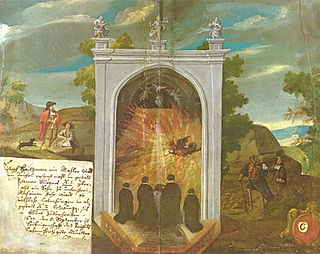
The idea of making a deal with the devil has appeared many times in works of popular culture. These pacts with the Devil can be found in many genres, including: books, music, comics, theater, movies, TV shows and games. When it comes to making a contract with the Devil, they all share the same prevailing desire, a mortal wants some worldly good for their own selfish gain, but in exchange, they must give up their soul for eternity.
"You Are Old, Father William" is a poem by Lewis Carroll that appears in his 1865 book Alice's Adventures in Wonderland. It is recited by Alice in Chapter 5, "Advice from a Caterpillar". Alice informs the Caterpillar that she has previously tried to repeat "How Doth the Little Busy Bee" and has had it all come wrong as "How Doth the Little Crocodile". The Caterpillar asks her to repeat "You Are Old, Father William", and she recites it.
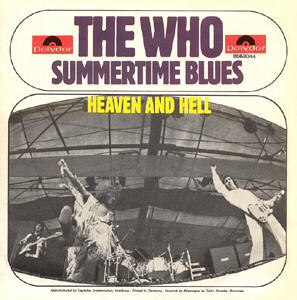
"Heaven and Hell" is a song by English rock band the Who written by group bassist John Entwistle. The studio version, which appeared on the B-side of the live "Summertime Blues" single, is currently available on the Thirty Years of Maximum R&B boxed set, Who's Missing, and Odds & Sods, although several live versions of the song exist on official releases. The song was one of many Entwistle B-side singles and one of his live staples.

Abigail Edna Disney is an American documentary film producer, philanthropist, social activist, and member of the Disney family. She produced the 2008 documentary Pray the Devil Back to Hell. Disney and Kathleen Hughes are producers and directors of Outstanding Social Issue Documentary Emmy Award winning The Armor of Light (2015) and The American Dream and Other Fairy Tales.

Welcome 2 My Nightmare is the nineteenth solo album by American rock musician Alice Cooper, released in September 2011. Peaking at No. 22 in the Billboard 200 it is Cooper's highest-charting album in the US since 1989's Trash. The album is a sequel to his 1975 album Welcome to My Nightmare.
"Death-Song of Conan the Cimmerian" is a 1972 fantasy narrative poem by American writer Lin Carter, featuring Robert E. Howard's sword and sorcery hero Conan the Barbarian. It was first published in Glenn Lord's Howard fanzine The Howard Collector, no. 17, Autumn, 1972, and reprinted in Carter's poetry collection Dreams from R'lyeh, and the magazine The Savage Sword of Conan v. 1, no. 8, October 1975. This last appearance included illustrations by Jess Jodloman.
References
- 1 2 Cohen, Norm (2000). Long Steel Rail: The Railroad in American Folksong. University of Illinois Press. pp. 638–642. ISBN 9780252068812.
- ↑ Gardner, Martin (1995). Famous Poems from Bygone Days. Courier Corporation. p. 7. ISBN 9780486286235.